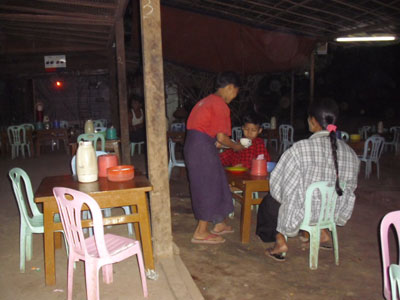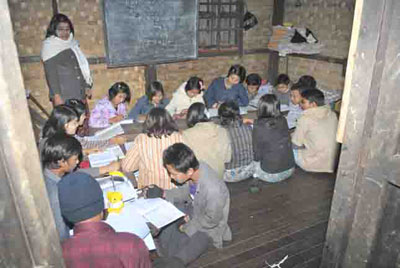Twelve year old Toe Aung works very hard 15 hours a day serving customers, cleaning tables and washing dishes in his aunt’s restaurant in Min Bya Township, in northern Arakan State, western Burma...
Twelve year old Toe Aung works very hard 15 hours a day serving customers, cleaning tables and washing dishes in his aunt’s restaurant in Min Bya Township, in northern Arakan State, western Burma. Then, he washes the plants and glasses at closing time, 9 pm, before he eats dinner.
 So, Toe Aung, looks forward to the weekends, as you can imagine.
So, Toe Aung, looks forward to the weekends, as you can imagine.
But, instead of spending his time and energy playing like a 12 year old, he attends a private school on Saturday and Sunday afternoons, where he studies hard because he believes a good education is vital for his future success.
“My Father was an uneducated daily laborer, so our family was always very poor,” he said in a recent interview. “After he died, my mother was unable to care for us children because she too is uneducated.”
He said he believes studying hard now, will lift him and his family out of the grinding poverty they have always known.
His mother, Ma Nyunt Sein, has remarried, so his younger brother and sister live with her. But, he lives with his aunt, Ma Phyu Chay, to work to pay for his living expenses.
He doesn’t receive a salary, but a little tip money, which he uses to pay for school supplies, books and school clothes.
Like any 12 year old boy, he would like to use the money to buy many things. However, he focuses on his dreams.
Many students are very interested in studying at the many private tutoring classes and boarding schools in the area, rather than studying in the public schools, because they believe the teachers are motivated by the extra pay to teach better in the private school setting.
The public school system in Burma has been criticized for not paying teachers well enough, so they often have to work as private tutors as well to support their families.
 However, these private schools are mostly out of reach of poor students because their families have to pay many fees for each child’s education.
However, these private schools are mostly out of reach of poor students because their families have to pay many fees for each child’s education.
For example, a middle school student has to pay 5,000 Kyat per year in school fees, plus the cost of drinking water, text books, as well as the cost of cleaning, and maintaining the school. Every student has to buy their text books from the home room teacher, who makes money from the sale.
Teachers collect 2,000-3,000 Kyat from each student to pay for security and school events.
Students also have to pay 1,500 Kyat for exam papers, or they can not write their exams.
One of Toe Aung’s friends was forced to leave school because her family cannot pay the school fees.
“My parents are daily laborers. So, they cannot afford to pay the school fees,” she said.
“I feel so ashamed.”
When Toe Aung finally finishes dinner after his long, hard day, he tries to do at least one hour of homework to prepare for the weekend classes. However, some nights he is just too tired.
But, Toe Aung is proud that he has passed all his school exams thus far.
“I want to win the prize for best student some day,” he said.
His aunt scolds him, saying, “You don’t have one handful of rice without your job, but all you think about is getting an education. You must focus on your job now.”
She shouts, “There are many educated people in Burma but there are no jobs for them.”
Toe Aung has heard his customers say, “Burmese people can’t get an education without money.”
But, he said imagines his mother’s face while he is cleaning up after his customers at night, and reminds himself, “I will be an educated and successful man one day.”



